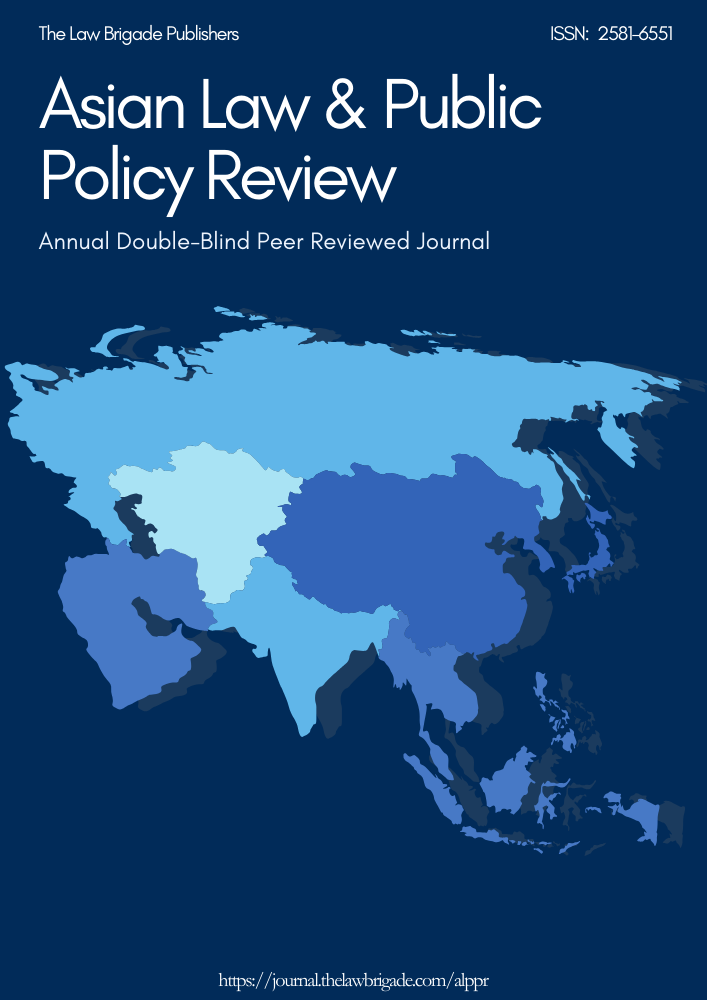Exploring Human Dignity in Africa through the Lens of a Muslim
Downloads
Keywords:
Muslim, Islam, African, IslamicAbstract
This study explores the relationship between Islam and human dignity in Africa, focusing on Islamic teachings on social justice, human rights, and ethical issues. It examines how Islam has influenced African conceptions and practices of human dignity, highlighting the obstacles to dignity and the effective ways Islamic values have been applied. The study provides theoretical advances in Islamic ethics, African societies, and human dignity, offering a framework for understanding human dignity in Africa from an Islamic perspective. It also highlights the challenges and possibilities for enhancing human dignity in African communities where Muslims predominate. The study encourages cooperation between Muslim and non-Muslim communities to find solutions to dignity-threatening issues.
External References to this Article
Loading reference data...
References
i Gewirth, A., Human rights: Essays on justification and applications (University of Chicago Press, USA, 1982)
15-355.
iiPew Research Center. The future of the global Muslim population (2011) accessed on 11/10/2022 at.
https://www.pewforum.org/2011/01/27/the-future-of-the-global-muslim-population/
iii Trimingham, J. S., A History of Islam in West Africa (Oxford University Press, London, 1962) 10-262.
iv Levtzion and Pouwels., The History of Islam in Africa, Review by: John Glover: The International Journal of
African Historical Studies (Boston University, USA, 2000) 33 (2) 411-412.
v Voll, J. O., ‘Islam and Democracy’ Religion Compass (Blackwell Publishing 2007) 1/1, 170-178. Also see
Levtzion and Powells, The History of Islam.
vi Gewirth, A., Human rights: Essays on justification and applications (University of Chicago Press, USA, 1982)
15-355. Also see Kateb, George (2011), Human Dignity. Cambridge, MA: The Belknap Press of Harvard
University Press, 2011. Page 5
vii Gewirth, A., Human rights: Essays on justification and applications (University of Chicago Press, USA, 1982)
15-355.
viiiThe World Bank Annual Report (2020), World Bank Annual Report September, 2020, page 44-45, 44-63.
ix Rahman, F., Major themes of the Qur'an (University of Chicago Press, USA, 2009) 49-13.
x Esposito, J. L. What everyone needs to know about Islam (Oxford University Press, London, 2011) 5-262.
xi Gade, C. B. N. ‘What is Ubuntu? Different interpretations among South Africans of African descent’, South
African Journal of Philosophy (2021) 31(3), 484-503. See also, Metz, T. ‘Ubuntu as a moral theory and human
rights in South Africa’ African Human Rights Law Journal (2011) 11(2), 532-559.
xii Levtzion and Pouwels., The History of Islam in Africa, Review by: John Glover: The International Journal of
African Historical Studies (Boston University, USA, 2000), 33 (2) 411-412.
xiii Metz, T. ‘Ubuntu as a moral theory and human rights in South Africa’ African Human Rights Law Journal
(2011) 11(2), 532-559.
xiv Rehman, J. ‘The Islamic concept of human dignity: Its implications for human rights’, Journal of Human
Rights, (2007) 6(4), 441-462.
xv Metz, T. ‘Ubuntu as a moral theory and human rights in South Africa.
xviHashemi, N. ‘Human dignity in Islamic thought’, Al-Idah, (2010) 25, 25-36.
xvii Kateb, George (2011), Human Dignity. Cambridge, MA: The Belknap Press of Harvard University Press,
2011. Page 5.
xviii Gewirth, A., Human rights: Essays on justification and applications (University of Chicago Press, USA, 1982)
15-355.
xix Donnelly, J. Universal human rights in theory and practice (2nd ed, Cornell University Press, Ithaca NY, 2003)
290.
xx Esposito, J. L. What everyone needs to know about Islam (Oxford University Press, London, 2011) 5-262.
xxi Levtzion and Pouwels., The History of Islam in Africa, Review by: John Glover: The International Journal of
African Historical Studies (Boston University, USA, 2000), 33 (2) 411-412.
xxii Hodgson, M. G. S. The venture of Islam: Conscience and history in a world civilization (University of Chicago
Press, USA, 1974)
xxiii United Nations (2019), The sustainable development goals report accessed 2019
https://unstats.un.org/sdgs/report/2019/
xxiv Davidson, B. The search for Africa: A history in the making. Times Books, 1998).
xxv Hashemi, N. ‘Human dignity in Islamic thought’, Al-Idah, (2010) 25, 25-36.
xxvi Qur'an., Translation by M. A. S. Abdel Haleem (Oxford University Press, London, n.d) 17:70.
xxvii Ali, A.., The Holy Qur'an: Text, translation, and commentary (2003), Tahrike Tarsile Qur'an.
xxviii Mohammed Hashim Kamali (2002), The Dignity of Man: An Islamic Perspective, Volume 1 of Fundamental
Rights and Liberties Series, Islamic Text Society, ISBN: 1903682037, 9781903682036, PP 1-73.
xxix Kiarash Aramesh, “Human Dignity in Islamic Bioethics”, Iran Journal of Allergy Asthma Immunal Vol. no.
5 (2007), pp 25-28.
xxx Rehman, J. ‘The Islamic concept of human dignity: Its implications for human rights’, Journal of Human
Rights, (2007) 6(4), 441-462.
xxxi Hashemi, N. ‘Human dignity in Islamic thought’, Al-Idah, (2010) 25, 25-36.
xxxii Levtzion and Pouwels., The History of Islam in Africa, Review by: John Glover: The International Journal
of African Historical Studies (Boston University, USA, 2000), 33 (2) 411-412.
xxxiiiThe World Bank Annual Report (2020), World Bank Annual Report September, 2020, page 44-45, 44-63.
xxxiv Abdul H. Ansari & Raheem K. Salman., ‘Human Dignity and Justice: The Islamic Perspective’, Journal of
Islamic Law Review (2011) 7 (1) 91-124.
xxxv Benthall & Bellion-Jourdan, ‘The Charitable Crescent: Politics of Aid in the Muslim World’, Journal of the
Royal Anthropological Institute, (2009)15 (4) 881-882.
xxxvi Abdullahi, A. A. ‘Islamic Human Rights and Human Dignity: An Agenda for Research and Policy Making’,
The International Journal of Human Rights (2012) 16(3), 437-453.
xxxvii Bello, A. G. ‘The Concept of Human Dignity in the Islamic Thought: Implications for Sustainable National
Development’ Journal of Sustainable Development in Africa (2016)18(4), 84-95.
xxxviii Mozaffari, Mohammad H. ‘The Concept of Human Dignity in the Islamic Thought’, Hekmat Quarterly
Journal, Canadian House of Wisdom (2011) 4, 11-27
xxxix Abdullahi, A. A. ‘Islamic Human Rights and Human Dignity: An Agenda for Research and Policy Making’,
The International Journal of Human Rights (2012) 16(3), 437-453.
xl Hashemi, N. ‘Human dignity in Islamic thought’, Al-Idah, (2010) 25, 25-36.
xli Abdul H. Ansari & Raheem K. Salman., ‘Human Dignity and Justice: The Islamic Perspective’, Journal of
Islamic Law Review (2011) 7(1) 91-124.
xlii Gade, C. B. N. ‘What is Ubuntu? Different interpretations among South Africans of African descent’, South
African Journal of Philosophy (2021) 31(3), 484-503.
xliiiEze, Michael Onyebuchi., ‘I am Because You Are: Cosmopolitanism in the Age of Xenophobia’, Philosophical
Papers, (2017) 46 (1) 85-109
xliv Mboti, N., ‘May the Real Ubantu Please Stand Up’, Journal of Media Ethics (2014) 30(2) 125–147.
xlv Murithi, Tim., ‘African Approaches to Building Peace and Social Solidarity’, African journal on conflict
resolution (2006) 6 (2) 9-33. Also see, Murithi Timothy., ‘Practical Peacemaking Wisdom from Africa:
Reflections on Ubuntu’, The Journal of Pan African Studies (2006)1 (4) 25-34.
xlvi Metz, T., ‘Ubuntu as a moral theory and human rights in South Africa’, African Human Rights Law Journal,
(2011) 11(2) 532-559.
xlvii Rahman, F. Major themes of the Qur'an (University of Chicago Press, USA, 2009).
xlviii Qur'an. Translation by M. A. S. Abdel Haleem (Oxford University Press, London, n.d) 17:70.
xlix Hashemi, N., ‘Human dignity in Islamic thought. Al-Idah’, (2010) 25, 25-36.
l Ali, A. Y. The Holy Qur'an: Text, translation, and commentary (2003) Tahrike Tarsile Qur'an
li Al-Bukhari, M. Sahih al-Bukhari (Dar al-Arqam, n.p. 1985).
lii Kamali, M. H. (2002). The dignity of man: An Islamic perspective. Islamic Texts Society.
liii Hashemi, N. ‘Human dignity in Islamic thought’, Al-Idah, (2010) 25, 25-36. Also see Rehman, J. ‘The Islamic
concept of human dignity: Its implications for human rights’, Journal of Human Rights (2007) 6(4) 441-462.
liv Hashemi, N. Human dignity in Islamic thought.
lv Rehman, J. ‘The Islamic concept of human dignity: Its implications for human rights’, Journal of Human Rights
(2007) 6(4) 441-462.
lvi Trimingham, J. S., A History of Islam in West Africa (Oxford University Press, London, 1962) 10-262.
lvii Levtzion and Pouwels., The History of Islam in Africa, Review by: John Glover: The International Journal of
African Historical Studies (Boston University, USA, 2000), 33 (2) 411-412.
lviii Loimeier, R. Muslim societies in Africa: A historical anthropology (Indiana University Press, USA, 2013).
lix Lewis, P., ‘Islamic Institutions and Civil Society in Nigeria: The Challenge of Ethnic and Religious Diversity’,
Journal of Muslim Minority Affairs (2002) 22(1) 155-166. Also see, Loimeier, R., Muslim societies in Africa:
lx Mazrui, A. A.,’Islam and Africa: Legacy and Reform’, The Islamic Quarterly (1997) 41(4), 267-282.
lxi Mazrui, A. A.,’Islam and Africa: Legacy and Reform’.
lxii Levtzion, N.,’Islam in West Africa: Religion, society, and politics to 1800’, Variorum (1994).
lxiii Coulon, C. ‘The Grand Magal in Touba: A religious festival of the Mouride brotherhood of Senegal’, African
Affairs (1988) 87(347) 195-210.
lxiv Levtzion, N.,’Islam in West Africa: Religion, society, and politics to 1800’, Variorum (1994)..
lxv Hirschkind, C., & Larkin, B., ‘Media, mediation, religion: An introduction’, Social Text (2018) 36(4) 1-10.
lxvi Soares, B. F., & Otayek, R., Islam and Muslim politics in Africa (Palgrave Macmillan, NY, 2007) 1-280.
lxvii Hirschkind, C., & Larkin, B. ‘Media, mediation, religion’
lxviii The World Bank Annual Report (2020), World Bank Annual Report September, 2020, page 44-45, 44-63.
lxix The World Bank Annual Report (2020)
lxx United Nations. (2019). The sustainable development goals report 2019.
https://unstats.un.org/sdgs/report/2019/
lxxi Themnér, L., & Wallensteen, P., ‘Armed conflicts, 1946–2013’, Journal of Peace Research, (2014) 51(4) 541-
554.
lxxii Transparency International. (2020). Corruption perceptions index 2020.
https://www.transparency.org/en/cpi/2020/index/nzl
lxxiii World Health Organization. (2020). Gender, equity, and human rights. https://www.who.int/gender-equityrights/knowledge/en/
lxxiv International Crisis Group. (2019). 10 conflicts to watch in 2019. https://www.crisisgroup.org/global/10-
conflicts-watch-2019
lxxv Gade, C. B. N. (2012). What is Ubuntu? Different interpretations among South Africans of African descent.
South African Journal of Philosophy, 31(3), 484-503. Also see Metz, T. (2011). Ubuntu as a moral theory and
human rights in South Africa. African Human Rights Law Journal, 11(2), 532-559.
lxxvi
lxxvii Benthall & Bellion-Jourdan, ‘The Charitable Crescent: Politics of Aid in the Muslim World’, Journal of the
Royal Anthropological Institute (2009) 15 (4) 881-882.
License Terms
Ownership and Licensing:
Authors of research papers submitted to any journal published by The Law Brigade Publishers retain the copyright of their work while granting the journal specific rights. Authors maintain ownership of the copyright and grant the journal the right of first publication. Simultaneously, authors agree to license their research papers under the Creative Commons Attribution-ShareAlike 4.0 International (CC BY-SA 4.0) License.
License Permissions:
Under the CC BY-SA 4.0 License, others are permitted to share and adapt the work, even for commercial purposes, provided that appropriate attribution is given to the authors, and acknowledgment is made of the initial publication by The Law Brigade Publishers. This license encourages the broad dissemination and reuse of research papers while ensuring that the original work is properly credited.
Additional Distribution Arrangements:
Authors are free to enter into separate, non-exclusive contractual arrangements for distributing the published version of the work (e.g., posting it to institutional repositories or publishing it in books), provided that the original publication by The Law Brigade Publishers is acknowledged.
Online Posting:
Authors are encouraged to share their work online (e.g., in institutional repositories or on personal websites) both prior to submission and after publication. This practice can facilitate productive exchanges and increase the visibility and citation of the work.
Responsibility and Liability:
Authors are responsible for ensuring that their submitted research papers do not infringe on the copyright, privacy, or other rights of third parties. The Law Brigade Publishers disclaims any liability for any copyright infringement or violation of third-party rights within the submitted research papers.
Published
Issue
Section
License

This work is licensed under a Creative Commons Attribution-NonCommercial-ShareAlike 4.0 International License.
Copyright © 2026 by Ahmed Salisu Garba
The copyright and license terms mentioned on this page take precedence over any other license terms mentioned on the article full text PDF or any other material associated with the article.


